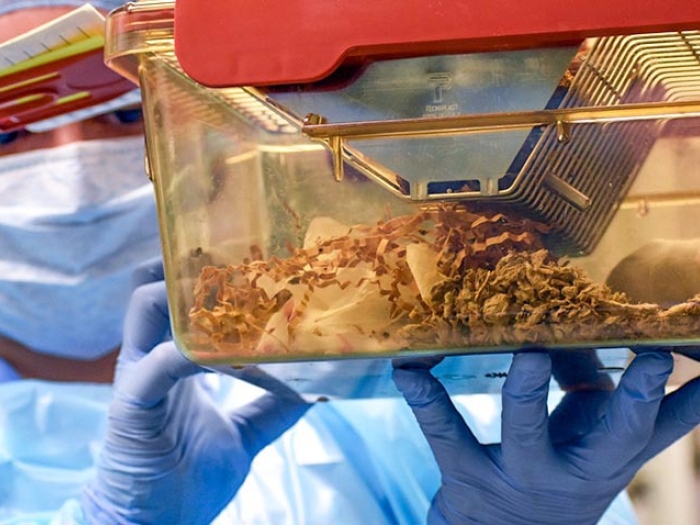Fusobacterium nucleatum promotes resistance to chemotherapy in colon cancer patients by turning off the push button for cancer cell suicide, a new study finds.
12:00 PM
Author |

A type of bacterium is associated with the recurrence of colorectal cancer and poor outcomes, researchers at Michigan Medicine and in China showed. Specifically, they found that Fusobacterium nucleatum in the gut can stop chemotherapy from causing a type of cancer cell death called apoptosis.
MORE FROM THE LAB: Subscribe to our weekly newsletter
Colorectal cancer is the third most common cancer and the second leading cause of cancer-related death in the U.S., according to the American Cancer Society. The two most widely used drugs to treat colorectal cancer act to either inhibit enzyme activity of cancer cells or arrest tumor cell growth. But the bacterium can make them ineffective.
"We treat patients with chemotherapy so that it will ultimately induce tumor cell apoptosis. But some cancer cells have a way to avoid apoptosis that is induced by chemotherapy," says Weiping Zou, M.D., Ph.D., professor of surgery at Michigan Medicine. "Those cells escape from the apoptosis process by activating a cell-survival mechanism called autophagy. That mechanism protects cancer cells from destructing.
"Once autophagy is active, the cancer becomes resistant to chemotherapy. Then Fusobacterium nucleatum keeps autophagy turned on. That's how the tumor cells may be able to avoid the induced apoptosis," says Zou.
Typically, autophagy can be turned on or off. But the bacterium prevents the expression of two microRNAs that, in turn, keeps the autophagy turned in the "on" position, he adds.
The collaborative study is published in Cell. The research was led by two teams, Zou at Michigan Medicine, and Jing-Yuan Fang, M.D., Ph.D., in Shanghai. Fang is a professor in Renji Hospital at the Shanghai Jiao Tong University School of Medicine.
We think that if we deal with this bacterium, we may be able to delay and prevent chemoresistance in colorectal cancer.Weiping Zou, M.D., Ph.D.
Building on past work
The idea to check the role of the bacterium associated with innate immune signaling in chemotherapy resistance was linked to an earlier study from this research team, published in Cell in 2016. In the previous paper, they studied adaptive immunity, specifically the impact of T-cells on chemoresistance, finding that it was reversely associated with resistance of cisplatin, the drug used for ovarian cancer. This means if patients have a strong T-cell immunity, their cancer cells are more sensitive to chemotherapy.
SEE ALSO: Free C3d Regulates Immune Checkpoint Blockade and Enhances Anti-Tumor Immunity
In the new Cell study, they researched whether bacterium-mediated innate immune signaling regulates chemotherapy resistance in colon cancer.
The innate immune system refers to the front-line defenders — the cells and molecular mechanisms that attack pathogens. The adaptive immune system is the body's response to specific antigens, such as foreign substances from bacteria or tumor-associated antigens from tumor cells.
Adaptive immunity is mediated by T-cell signaling. Innate immunity is mediated by innate signaling including proteins called Toll-like receptors.
"We knew that the body uses both systems, adaptive and innate, to fight cancer and infectious pathogens. That gave us the inspiration to look further at bacterium associated with innate immune signaling.
"The results of the research were a surprise. We did not expect bacterium to contribute to chemoresistance," says Zou.
There are other factors that are unknown about F. nucleatum. For example, what would happen if the bacterium were reduced or blocked? Might other prevalent bacterium create a similar problem with chemoresistance?
"Right now, we don't have a specific approach to selectively treat or control Fusobacterium nucleatum. Also, we don't know if an abundance of this bacterium is found in any other types of cancer chemoresistance," says Zou. "Still, based on our studies, we think that if we deal with this bacterium, we may be able to delay and prevent chemoresistance in colorectal cancer."

Explore a variety of health care news & stories by visiting the Health Lab home page for more articles.

Department of Communication at Michigan Medicine
Want top health & research news weekly? Sign up for Health Lab’s newsletters today!





